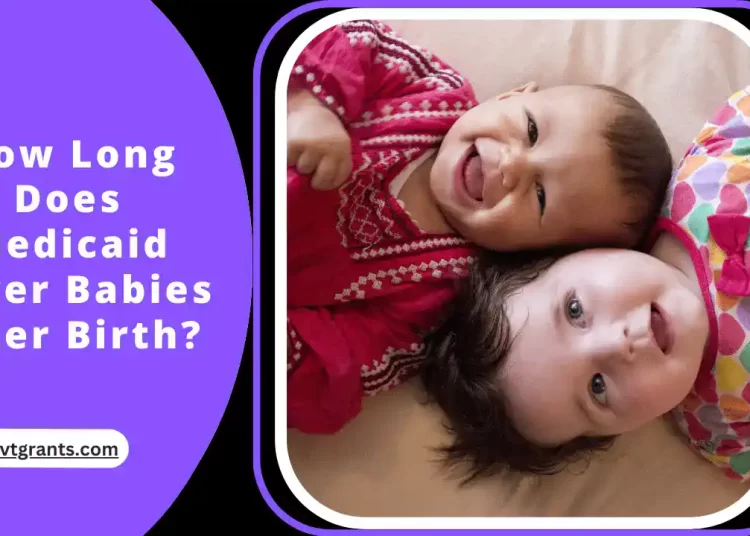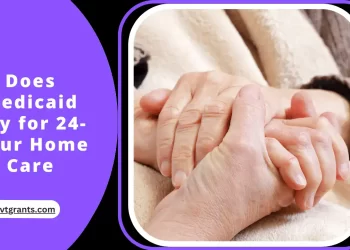How Long Does Medicaid Cover Babies After Birth? – Health insurance coverage affects how people use their healthcare services. Underinsured women have a hard time getting the medical assistance they need before, during, and after pregnancy, unlike insured women, and this impacts their and their baby’s health. According to a recent CDC study, nearly 31% of maternal deaths occur during pregnancy, 64% of deaths occur during delivery or the week after, and nearly 33% occur one week to one year after delivery. Fortunately, the Medicaid program offers health insurance for pregnant women to get adequate prenatal and postpartum care.
If you’re pregnant and enrolled in the Medicaid program to cover the childbirth cost, then you may wonder: ‘How long does Medicaid cover babies after birth?’ You would be happy to know that your newborn will be automatically enrolled in the Medicaid program under your plan. The plan covers newborns until their first birth, after which they can enroll their children in the Children’s Health Insurance Program (CHIP). In this comprehensive guide, we will provide all the ins and outs of how you can get coverage for your newborn under Medicaid.
Highlights of this Post
Key Takeaways
- Newborns are automatically covered under their parent’s Medicaid immediately after birth. This coverage is often referred to as “deemed newborn coverage” and lasts for up to one year without regard to changes in family income.
- In several states, Medicaid offers extended postpartum coverage up to 12 months to provide comprehensive care beyond the standard 60 days, addressing everything from prenatal to postnatal care.
- After the first year, children can transition from Medicaid to the Children’s Health Insurance Program (CHIP), ensuring continuous coverage as they grow.
- Pregnant women who are already insured can still qualify for Medicaid, which can supplement their existing insurance by covering additional services and costs not included in private plans.
- To apply for Medicaid, prospective recipients must submit proof of income, residency, and pregnancy, with specific documents required varying by state. It’s important to apply as soon as possible to ensure coverage starts promptly.
Can I Get Pregnancy Medicaid If I Have Insurance?
All marketplaces, including Medicaid plans, cover pregnancy and childbirth. This is true even if your pregnancy starts before your coverage. Maternity care and newborn care services are provided by Medicaid before and after your child is born and are considered essential health benefits. This means all qualified health plans outside and inside the marketplace should cover them.
If you meet the eligibility and income requirements for Medicaid, you can use it alongside a private insurance plan, except in three states. If you’re eligible for Medicaid, your details will be sent to the state agency, and you won’t be able to keep your marketplace coverage. However, when your pregnancy Medicaid ends, you can sign up for the marketplace coverage again during the special enrollment period. If you have Marketplace coverage and report your pregnancy, you can get free or low-cost coverage through Medicaid or CHIP.
Want to know whether Fertility Treatments Are Covered by Medicare or not? Our next blog will cover all insights for you.
What Is The Medicaid Coverage For Newborns After Birth?
Newborns are covered automatically by their parents’ Medicaid coverage plan. The program assists candidates with the process of childbirth as well as postnatal care services.
The services provided by the Medicaid program may differ from one state to another. Parents must enroll their newborn in their Medicaid coverage as quickly as possible within the first year to make sure proper steps can be taken to ensure the child’s good health. This coverage is known as ‘deemed newborn coverage’ that lasts irrespective of changes in the household income.
Parents can also choose to have their newborn added to their existing Medicaid plan for better convenience. A lot of parents enroll their newborns in their healthcare assistance plan to suit their needs. The eligibility for the Medicaid benefit is based on your income level.
In a few U.S. states, the coverage lasts longer. For instance, in Georgia, the Medicaid plan provides 12 months of postpartum coverage that includes pregnancy services, family planning, gynecologic services, self-reference to women’s health specialists, and so on.
What Is the CHIP Coverage for Newborns After Birth?
A lot of parents turn to the Children’s Health Insurance program in the first year of their Medicaid coverage, when it is about to expire. The program offers low-cost or free coverage for children of all ages until they become adults.
Similar to Medicaid, the CHIP program has different coverage limitations and eligibility requirements in individual states. All guardians, including birth parents, can enroll their children in the CHIP program. The program includes, but is not limited to, the following:
- Shorts
- Regular checkups
- Dental and vision care
- X-ray and lab test hospital care
- Treatment of special health needs.
Want to know how to get a free YMCA membership with medicaid? Read our next guide here.
What Is The Medicaid Coverage During And After Pregnancy?
If you are pregnant and receiving financial aid from Medicaid for the cause related to pregnancy before birth, then the benefits will continue after birth for up to 60 days. In a few cases, adults cannot adjust their health insurance plan until it has ended, but pregnant women are among the few exceptions.
If you’re pregnant, you can adjust your healthcare services before and after the birth of a newborn to make sure they get the best plan. It is important to notify Medicaid about expecting a child in the family to reduce your rates and expand coverage. Medicaid does not have a specific enrollment period, so new moms can apply for assistance during any part of the calendar year.
How To Keep Medicaid After Pregnancy? A List of Eligibility Criteria To Follow
The general eligibility guidelines for Medicaid are set by the federal government. However, individuals state they set up their own criteria for benefits, coverage, and eligibility that may differ from one place to another. Following is the list of common criteria that you need to fulfill to get approved for Medicaid while pregnant:
- Must have income at or below 133% of the federal poverty level to get coverage under a ‘categorically needed group’. The medically needed group covers pregnant women who earn too much to fit in the categorically needed group and get expanded eligibility for their health condition.
- Must be a citizen of the United States or a legal immigrant.
- Must fulfill the household size criteria set by your state’s Medicaid program.
- Must provide proof of documents in the form of your pregnancy, citizenship, or legal residency, including income documents, to verify your situation.
Note: If the annual income of the household disqualifies a pregnant woman for full coverage, there is still hope. Medicaid covers pregnancy-related services and other conditions that pose a risk during pregnancy. The income criteria for pregnancy-related aid through Medicaid ranges between 133% and 185% of the FPL guidelines.
How Long Can You Lose Medicaid While Pregnant?
The Medicaid coverage for pregnant women generally lasts at least 60 days after giving birth. However, a few states provide coverage for up to 12 months. You can check with your state for comprehensive information or view states that provide extended coverage.
The Children’s Health Insurance Program offers limited coverage during pregnancy and two postpartum visits within 60 days of the end of the pregnancy for women who are ineligible for Medicaid and do not have private health insurance. Once the postpartum period ends, your state will evaluate your eligibility for any other Medicaid coverage services.
Do I Lose Medicaid If I Have A Miscarriage?
Medicaid covers individuals who have experienced a miscarriage for at least 60 days after the pregnancy ends. This includes all medical services like counseling, prescription drugs, and grief support. In a few states, like Florida, Medicaid has extended the postpartum coverage period up to 12 months. As of April 2023 nearly 38 U.S. states had planned or implemented the 12-month extension.
You need to contact your state Medicaid office to determine what is covered in your specific state. Under the American Rescue Plan Act of 2021, the state Medicaid program extends the postpartum coverage period to 12 months. Those who qualify for the Medicaid program because they are pregnant will be eligible for a minimum 60 days after the end of pregnancy, allowing for continued medical care during the postpartum including miscarriages.
Head over to our next guide to know how to get free braces with Medicaid.
How To Apply For Emergency Medicaid For Pregnancy And Newborn?
In order to pay for emergency Medicaid for pregnancy and newborn you must follow the below-mentioned steps carefully:
- Determine the eligibility criteria for the emergency Medicaid program that generally requires you to have an emergency associated with pregnancy or childbirth, and be citizens of the United States or legal immigrants
- You also need to contact your state Medicaid office to apply for the emergency Medicaid program or visit your state’s Medicaid website to get specific instructions.
- The next step requires you to fill out an application for an Emergency Medicaid Program that can be available online at all local Medicaid offices.
- Fill out the application form and provide relevant documents associated with your pregnancy, residency, medical emergency, and income.
- Next, you need to submit the application and documentation as required and follow up with the state Medicaid office to check the status of your application.
Does Medicaid Cover Labor And Delivery?
Yes, the Medicaid program covers labor as well as delivery costs, including pregnancy-associated services for qualified women. The Medicaid program is a source of healthcare coverage for several low-income pregnant women, and as per 2023 reports, nearly half of all births in America were covered by the Medicaid program.
Following is the list of services that you can get if you are currently enrolled in the Medicaid program.
- Prenatal care that includes prenatal vitamins and visits to your doctor
- Newborn care that includes checkups and other benefits after the baby is born
- Postpartum care that offers coverage to mothers for at least 60 days after giving birth, and few states have extended this to 12 months.
- Non-medical support services in a few states that are expanded to provide comprehensive benefits to pregnant women, for instance, education.
Our next blog will throw insights on Child Therapist Who Accepts Medicaid.
How To Prepare For A Medicaid Birth?
The good news is that you can provide the best support and care to your newborn by being informed. Here is the information on how to prepare for delivering a baby on Medicaid.
Know What Is Covered
An extensive list of Medicaid services is provided by the Kaiser Family Foundation, and the coverage may vary, but most of the states provides the following:
- Basic prenatal care
- Ultrasound
ACA requires breast pumps, even though the coverage may vary depending on the insurance plan. Doula care is covered in Minnesota, Oregon and New Jersey. Testing for genetic abnormalities can be provided in a few states. Nearly all U.S. states offer case management services to help people get specialty services like financial assistance and depression screenings.
Know How To Activate Medicaid For Newborn
The process and eligibility to add a newborn child to your Medicaid program may vary. In the below section, we have covered a few states and their process to add newborns to the Medicaid program.
- Texas: Newborn children born to perinatal women generally switched to Medicaid on their birth date.
- Florida: Applicants can fax the completed unborn activation form to the Florida medical physical agent at 877-231-2170 and activate the newborn child’s Medicaid ID number.
- Pennsylvania: Applicants can contact 855-227-1302 after their child’s birth to choose a primary care provider and get a GHP family member ID card.
How To Add Newborns To Medicaid GA?
If you’re wondering how to add a newborn to Medicaid GA, then you must register or log in to the State Health Benefit Plan (SHBP) enrollment portal and declare the birth event within 90 days of your newborn child’s birth date.
To know how long does Medicaid cover babies after birth in GA you can also visit the portal 24 hours a day or seven days per week, or contact the SHBP member service at 800-610-1863 (Monday to Friday 8:30 AM to 5:00 PM ET and Saturday 8:00 AM to 5:00 PM ET).
You need to notify SHBP member services within 45 days and provide a copy of the certified birth certificate or birth card issued by the hospital listing the audience by name, including the child’s Social Security number.
In case you fail to notify, you have to wait until the next open enrollment period unless you experience a special enrollment event or another qualifying event to make a change to your coverage. If you’re not currently covered by the health plan, you have to enroll and declare the qualifying event to add your newborn to coverage.
How To Add Newborns To Medicaid VA?
If you’re enrolled in FAMIS, FAMIS MOMS, or Medicaid and have given birth recently, then you can report the birth of your new baby in one of these ways.
- Contact the Cover Virginia call center at 833-5CALLS (TDD: 1-888-221-1591).
- You must contact your local Department of Social Services (DSS)
- You must ask the hospital to submit the enrollment information for your newborn child. To learn how long Medicaid covers babies after birth as well as the application process in VA click here.
Want to know if you can get a free breast pump through Medicaid? Head to our next blog to learn all the insights.
Maximum Medicaid/ CHIP Income Eligibility Limit For Pregnancy: Statewide Medicaid Postpartum Coverage
The Medicaid program sponsors 4 in 10 births in America. As per the federal law, states have to offer pregnancy-associated Medicaid coverage for 60 days postpartum. To boost maternal health and coverage, a provision in the American Rescue Plan Act of 2021 enables states to extend Medicaid postpartum coverage to 12 months through state plan amendments. Following are the statewide Medicaid postpartum coverage extensions and maximum income eligibility limit for pregnancy (% FPL) as of August 1, 2024:
- Alabama: 317% (ACA Medicaid expansion not adopted)
- Alaska: 205% (ACA Medicaid expansion not adopted)
- Arizona: 161% (ACA Medicaid expansion adopted)
- California: 322% (ACA Medicaid expansion adopted)
- Colorado: 265% (ACA Medicaid expansion adopted)
- Connecticut: 263% (ACA Medicaid expansion adopted)
- Delaware: 217% (ACA Medicaid expansion adopted)
- District of Columbia: 324% (ACA Medicaid expansion adopted)
- Florida: 196% (ACA Medicaid expansion not adopted)
- Georgia: 125% (ACA Medicaid expansion not adopted)
- Hawaii: 196% (ACA Medicaid expansion adopted)
- Idaho: 138% (ACA Medicaid expansion adopted)
- Illinois: 213% (ACA Medicaid expansion adopted)
- Indiana: 213% (ACA Medicaid expansion adopted)
- Iowa: 380% (ACA Medicaid expansion adopted)
- Kansas: 171% (ACA Medicaid expansion not adopted)
- Kentucky: 213% (ACA Medicaid expansion not adopted)
- Montana: 162% (ACA Medicaid expansion adopted)
- Mississippi: 199% (ACA Medicaid expansion not adopted)
- Massachusetts: 205% (ACA Medicaid expansion not adopted)
- Maryland: 264% (ACA Medicaid expansion not adopted)
- Maine: 214% (ACA Medicaid expansion not adopted)
- Minnesota: 283% (ACA Medicaid expansion not adopted)
- Missouri: 305% (ACA Medicaid expansion not adopted)
- Nebraska 202% (ACA Medicaid expansion not adopted)
- North Carolina: 201% (ACA Medicaid expansion adopted)
- New York: 223% (ACA Medicaid expansion adopted)
- North Dakota: 175% (ACA Medicaid expansion adopted)
- New Hampshire: 201% (ACA Medicaid expansion adopted)
- Nevada: 190% (ACA Medicaid expansion adopted)
- New Mexico: 255% (ACA Medicaid expansion adopted)
- New Jersey: 205% (ACA Medicaid expansion adopted)
- Oklahoma 210% (ACA Medicaid expansion adopted)
- Ohio 205% (ACA Medicaid expansion adopted)
- Oregon: 119% (ACA Medicaid expansion adopted)
- Pennsylvania: 220% (ACA Medicaid expansion adopted)
- South Carolina: 199% (ACA Medicaid expansion not adopted)
- South Dakota: 138% (ACA Medicaid expansion adopted)
- Texas: 207% (ACA Medicaid expansion not adopted)
- Tennessee: 255% (ACA Medicaid expansion not adopted)
- Utah: 144% (ACA Medicaid expansion adopted)
- Rhode Island: 258% (ACA Medicaid expansion adopted)
- Virginia 205% (ACA Medicaid expansion adopted)
- Vermont: 213% (ACA Medicaid expansion adopted)
- Washington: 198% (ACA Medicaid expansion adopted)
- Wisconsin: 306% (ACA Medicaid expansion not adopted)
- West Virginia: 305% (ACA Medicaid expansion adopted)
- Wyoming: 159% (ACA Medicaid expansion not adopted).
You can take a look at our next guide to know if you can get pediatric diapers covered by Medicaid.
Conclusion
To sum up, pregnant women enrolled in the Medicaid program and wondering how long does Medicaid cover babies after birth would be pleased to note that their newborn will automatically qualify for the Medicaid program until their first birthday. Mothers getting Medicaid benefits for pregnancy-associated causes will continue to receive the benefits up to 60 days after birth. It is important to research the Medicaid coverage in your state for both prenatal and postpartum to have a better idea about your and your family’s health care plan. The regulations and policies may differ from one state to another. Enrolling your newborn child in their healthcare either through Medicaid or CHIP is important to make sure a smooth transition of healthcare coverage.
Check out our blog at Get Government Grants to avail free resources and government programs for low-income families. Our guide has numerous supportive programs and names of organizations that help people in times of need.
Frequently Asked Questions
How Long Does Medicaid Cover A Baby After Birth In Texas?
The Texas Health and Human Services Commission extended its postpartum Medicaid and CHIP coverage up to 12 months for qualified women effective March 1, 2024.
Can You Get Maternity Insurance If You’re Already Pregnant?
It is not possible to get maternity coverage once you are pregnant since the waiting period ranges between 9 months and 2 years, depending on the policy.
Does Medicaid Cover Pregnancy Ultrasounds?
Yes, Medicaid covers prenatal sounds for pregnant women. However, few states impose limitations on the coverage, require prescriptions for prenatal vitamins, and even limit the number of ultrasounds.
Can a Pregnant Woman Be Denied Medicaid?
Pregnant women are given priority in determining Medicaid eligibility. Most offices try to qualify pregnant women within two to four weeks. You can be denied if you fail to fulfill the specific criteria.















